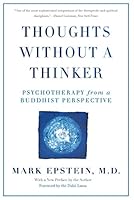
## Metadata
- Author: [[Mark Epstein]]
- Full Title: Thoughts Without a Thinker
- Category: #books
## Highlights
- the relentless demand to make relationships flawless squeezes the life out of them. ([Location 159](https://readwise.io/to_kindle?action=open&asin=B00DZ241SW&location=159))
- To study Buddhism is to study the self. To study the self is to forget the self. To forget the self is to be one with others. ([Location 475](https://readwise.io/to_kindle?action=open&asin=B00DZ241SW&location=475))
- What we call happiness in the strict sense comes from the (preferably sudden) satisfaction of needs which have been dammed up to a high degree, and it is from its nature only possible as a periodic phenomenon. When any situation that is desired by the pleasure principle is prolonged it only produces a feeling of mild contentment. We are so made that we can derive intense enjoyment only from a contrast and very little from a state of things. Thus our possibilities of happiness are already restricted by our constitution. ([Location 566](https://readwise.io/to_kindle?action=open&asin=B00DZ241SW&location=566))
- This is the state that has been called confluence in Gestalt therapy: the merger of orgasm, the assimilation of digested food, the attunement of the infant at the breast, the satisfaction of any completed experience in which a new whole is created and the self temporarily dissolves. ([Location 638](https://readwise.io/to_kindle?action=open&asin=B00DZ241SW&location=638))
- As Winnicott commented, “It is joy to be hidden but disaster not to be found.” ([Location 726](https://readwise.io/to_kindle?action=open&asin=B00DZ241SW&location=726))
- While “suffering” is the conventional translation for the Buddha’s word dukkha, it does not really do the word justice. A more specific translation would be something on the order of “pervasive unsatisfactoriness. ([Location 828](https://readwise.io/to_kindle?action=open&asin=B00DZ241SW&location=828))